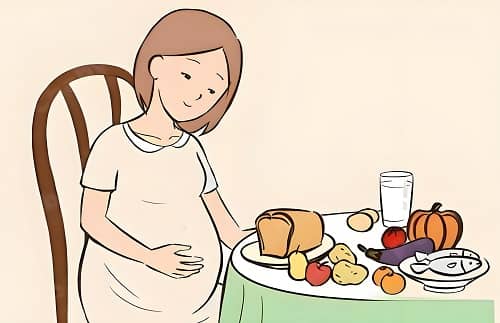A balanced and nutritious diet is crucial during pregnancy to support the healthy development of the baby and maintain the mother’s well-being. Here are some practical dietary tips to ensure both mother and baby thrive during this special time.

Table of Contents
- 1. Balanced Diet for Comprehensive Nutrition
- 2. Folic Acid Supplementation to Prevent Neural Tube Defects
- 3. Adequate Protein Intake for Fetal Growth
- 4. Increased Calcium and Iron Intake
- 5. Limiting High-Sugar, High-Salt, and High-Fat Foods
- 6. Small, Frequent Meals to Ease Morning Sickness
- 7. Omega-3 for Brain Development
- 8. Staying Hydrated
1. Balanced Diet for Comprehensive Nutrition
A varied diet ensures an adequate intake of proteins, vitamins, minerals, and healthy fats. Include fresh fruits, vegetables, whole grains, lean meats, nuts, and legumes to maintain a balanced nutrient intake, which is essential for both maternal health and fetal development.
2. Folic Acid Supplementation to Prevent Neural Tube Defects
Folic acid is essential during pregnancy to reduce the risk of neural tube defects in the baby. Expectant mothers are advised to take 400 micrograms of folic acid daily, especially during the first trimester. Foods rich in folic acid, such as leafy greens, beans, and citrus fruits, should also be included in the diet.
3. Adequate Protein Intake for Fetal Growth
Protein is vital for the baby’s growth and tissue development. Pregnant women should consume quality protein sources such as eggs, lean meats, dairy products, tofu, and fish. Protein needs increase in the second and third trimesters, so it’s important to adjust accordingly.
4. Increased Calcium and Iron Intake
Calcium supports the baby’s bone and teeth development, while iron helps prevent maternal anemia. Include calcium-rich foods like low-fat dairy products, tofu, and leafy greens. For iron, incorporate red meat, fish, beans, and fortified cereals into your meals, paired with vitamin C-rich foods for better absorption.
5. Limiting High-Sugar, High-Salt, and High-Fat Foods
Avoid excessive consumption of processed foods, sweets, fried items, and salty snacks to prevent rapid weight gain, blood sugar spikes, and pregnancy-related hypertension. Opt for fresh, whole foods and healthier cooking methods like steaming and baking.
6. Small, Frequent Meals to Ease Morning Sickness
Morning sickness and digestive discomfort are common during early pregnancy. To alleviate these symptoms, try eating five to six small meals throughout the day. Choose easily digestible foods like whole-grain bread, bananas, and cooked vegetables to help settle the stomach.
7. Omega-3 for Brain Development
Omega-3 fatty acids are crucial for the baby’s brain and vision development. Include Omega-3-rich foods like salmon, flaxseeds, and walnuts to support the healthy growth of the baby’s nervous system.
8. Staying Hydrated
With increased blood volume during pregnancy, staying hydrated is essential. Aim to drink at least 2,000 milliliters of water daily. Limit caffeinated beverages to avoid their diuretic effects, which can lead to dehydration.
By following a well-balanced and nutrient-rich diet, you can provide the best foundation for your baby’s healthy growth while enjoying a smoother pregnancy journey!